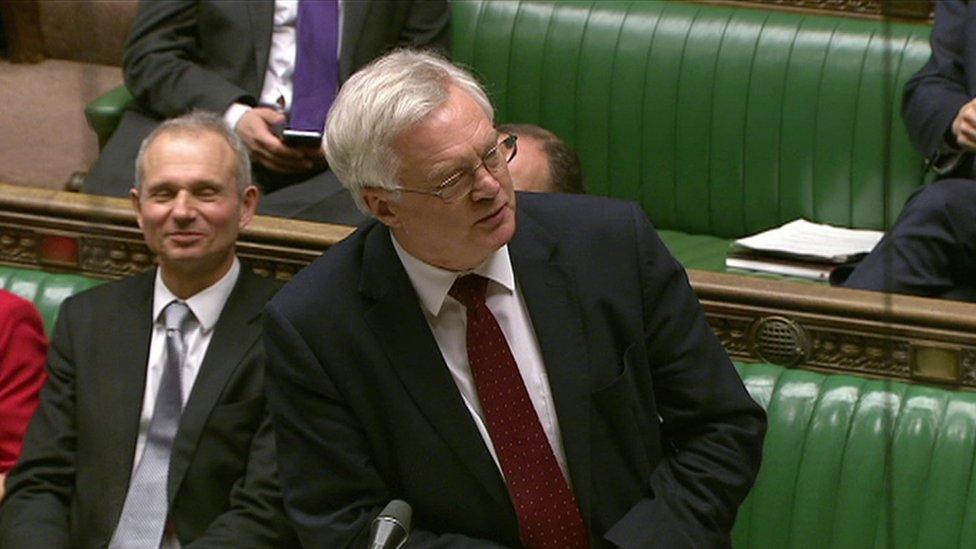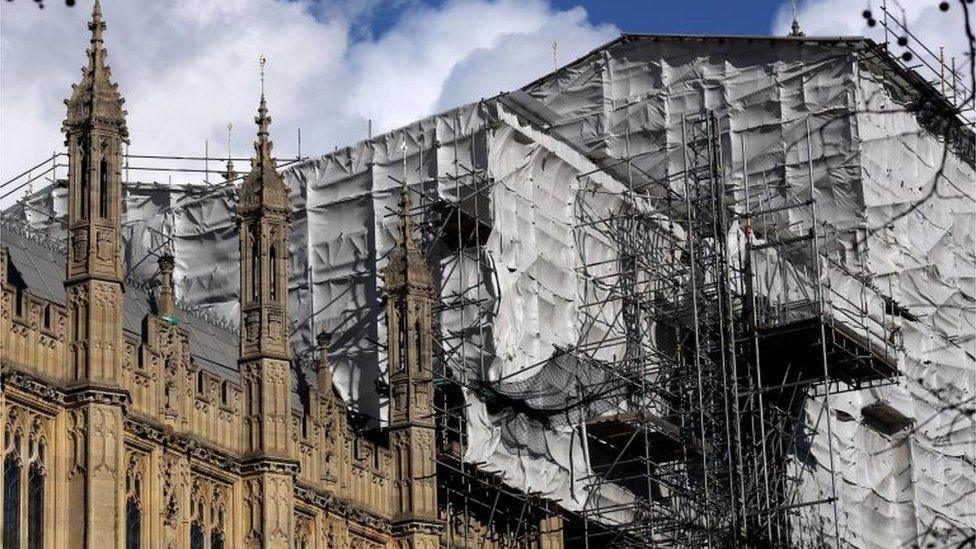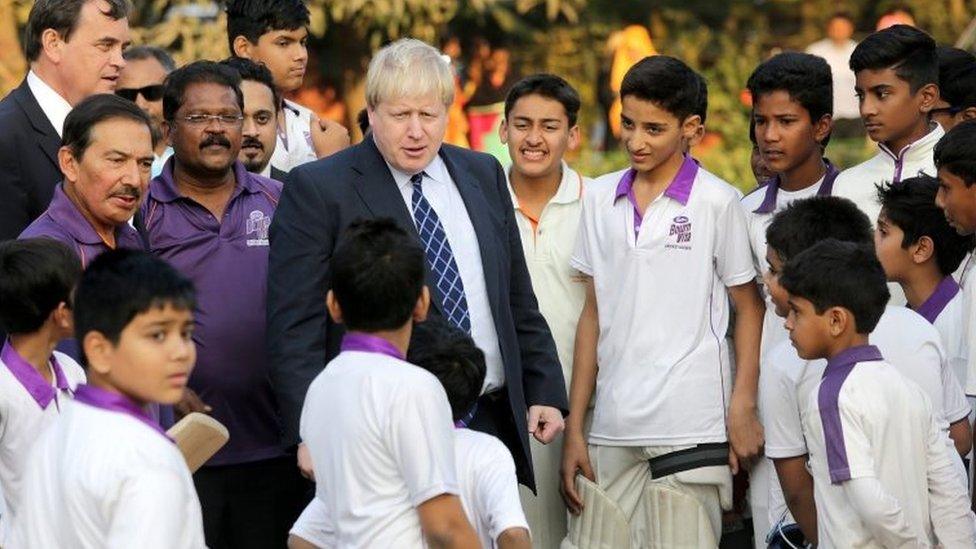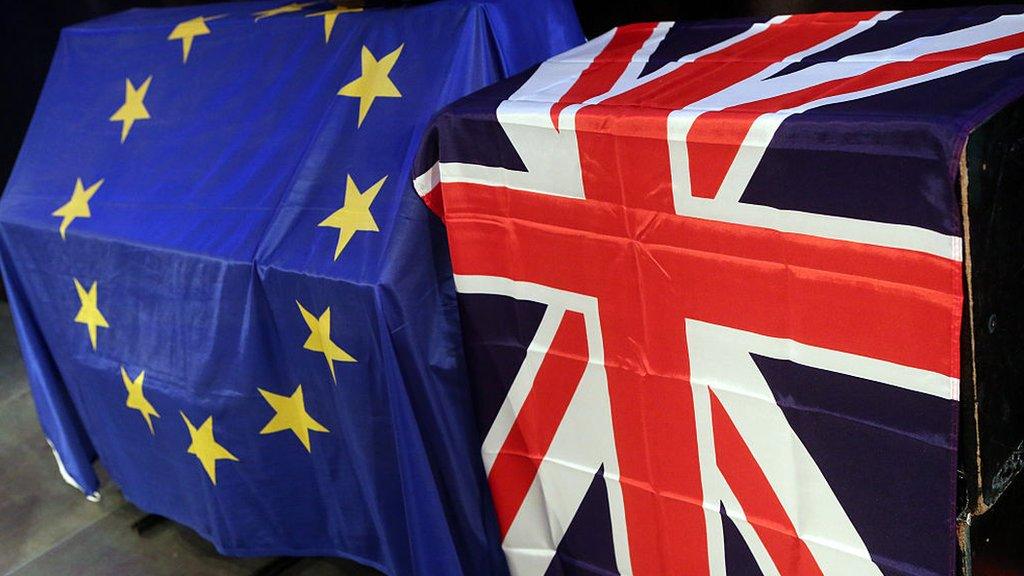Week ahead
- Published
- comments

The Brexit Secretary, David Davis, will make a statement to Parliament following the Supreme Court judgement, outlining Parliament's future role
Having trailed the possibility of a Supreme Court ruling, external on Parliament's role in triggering the formal EU process for Brexit - Article 50 - for the last two weeks, we finally have a definite date for this crucial announcement: Tuesday.
The government will give its response in a statement from the Brexit Secretary David Davis, with business being interrupted at some point in mid-afternoon, after ministers have had a chance to digest the small print of the judgment.
If, as expected, the Supremes announce that a full-scale bill has to go through Parliament, he may well announce the timing there and then.
Any bill will of course require the full cycle of second reading, committee, report and third reading proceedings in both Commons and Lords - and the critical point will be the amount of time allowed, particularly to MPs.
The smart move would be to clear a pretty humdrum parliamentary schedule and let them debate Article 50 until they drop, to defuse any suspicion that discussion has been curtained by procedural jiggery-pokery.
Allowing a fairly generous timing would mean that, once passed by the Commons, their lordships would get their teeth into the bill on the far side of Parliament's February half-term - so at some point after 20 February. This would leave plenty of time to meet the government's deadline of triggering the Article 50 withdrawal process by the end of March.
It will also leave plenty of time for the party politics of Brexit to unfold - and there will be plenty of markers going down in response to Mr Davis's statement.
Labour's response from front and backbenches will be particularly interesting; their heartland voters are polarised between Leave and Remain, which means that many Labour MPs, face an agonising dilemma over which way to vote. Either way, their decisions could be career-threatening or seat-threatening.
I doubt many Conservatives would vote against - and any who dared could be for the high jump. In the Lords, there are murmurings of an organised attempt to resist Article 50, with any number of Europhile peers across the parties, rattling their sabres. There may be some attempt at a doomed last stand by diehard Remainers, but there seems little prospect of a blocking majority against Article 50 in either House.
Here's my rundown of the week ahead:
Monday
The Commons week begins (2.30pm) with Home Office questions - and watch out for the usual crop of post-weekend ministerial statements and urgent questions at 3.30pm.
Labour whips are expected to move the writ for a by-election in Copeland and Stoke on Trent Central, after the departure of Tristram Hunt; voting is expected to take place on 23 February.
The main debate will be on the second reading of the Local Government Finance Bill , external- this is a major measure to give local councils 100% of the take from business rates. It's a very big and complex bill, which will probably spend a gruelling five weeks or more in committee - and Labour look set to vote against it, arguing that it amounts to "financial gerrymandering" of support to local authorities, in a way which favours the Conservative ones.
The adjournment debate, led by the Conservative Maria Miller, who chairs the Women and Equalities Committee, is on sex and relationship education - following her committee's report on sexual harassment in schools, she has launched a campaign #supportSSRE to require age-appropriate Sex and Relationship Education.
In Westminster Hall (4.30pm) MPs will debate e-petition 167596 relating to the banning of non-recyclable and non-compostable packaging - the petition notes that the UK fails to recycle over 1.5 million tonnes of plastic packaging waste each year, and calling for 100% recyclable/compostable packaging on every product in the UK. So far this petition has attracted 74,239 signatures.
My committee of the day is the Public Accounts hearing (4pm) on the financial sustainability of schools in England, which are faced with a requirement to save £3bn (£1.3bn in efficiencies and £1.7bn from better use of staff) in the coming year. The committee will hear from a series of head teachers and then from Department for Education officials and from Peter Lauener, Chief Executive, Education Funding Agency, about what this will mean in the classroom.
In the Lords (2.30pm), the main event is the fifth committee stage day devoted to the Higher Education and Research Bill - the key issue is the remainder of the Office for Students. Dinner business is a debate on the current human rights situation in Iran.
Tuesday
The Commons opens (11.30am) with Justice questions. That is followed by an interesting and topical Ten Minute Rule Bill: the Industrial Action (Protection of Critical National Services) from the Croydon Conservative Chris Philp, whose constituency has been seriously affected by the long running dispute on Southern Trains. He's floating a proposal for a ban on disproportionate industrial action; an outright strike ban might fall foul of human rights law, but this proposal parallels arrangements in several European countries.
At some point during these proceedings, but a bit later than the normal 12.30pm slot for ministerial statements, the Brexit Secretary, David Davis is expected to respond to the outcome of the Supreme Court case on whether Parliament needs to vote, perhaps even pass a bill to invoke Article 50 of the Lisbon Treaty and trigger the formal process of Britain's withdrawal from the EU.
He may even announce the date for legislation, if that is what is required. And watch out for early markers from Remainer MPs on caveats and conditions they plan to add to any bill. Expect something approaching two hours on this.
Wrapped around that will be Consideration of Lords' amendments to the Wales Bill, external - the government did not lose any votes in the Lords, so this will amount to rubber stamping the various tweaks and corrections it has made to its own legislation. Then MPs will deal with motions on the Charter for Budget Responsibility, and the appointment of the new Parliamentary and Health Service Ombudsman.
In Westminster Hall (9.30am-11am) there's a debate on the Midlands Engine (the Midland answer to the Northern Powerhouse concept) led by the Conservative Chris White, who will outline his views on how devolution can give the region the resources it needs to provide the framework for businesses to compete internationally. I wonder if the impending election of a West Midlands Mayor might be mentioned?
Yeovil MP Marcus Fysh raises the future of Somerset's aerospace industry (11am-11.30am) and the highly skilled jobs it supports.
And my eye was also caught by the former Cabinet Minister Theresa Villiers' debate (4.30pm-5.30pm) on animal welfare standards in farming after the UK leaves the EU - she will highlight that Brexit will give the UK new choices on animal welfare. Ministers could, for example, decide to ban the live export of animals, something the EU has prevented, up to now.

Theresa Villiers wants to examine whether Brexit would see a ban on the live export of animals
At present, most UK rules on the welfare of farm animals originate from the EU and she argues that Britain has been held back by the reluctance of other countries to opt for high standards, and that the government should be prepared to toughen the rules in certain areas, including banning live export of animals for slaughter and discouraging intensive farming practices like indoor dairy herds.
And she adds: "We should be prepared to ask other countries to match our standards if they want access to our markets."
My pick for committee of the day is the business, energy and industrial strategy hearing on directors' duties, executive pay and boardroom diversity (9.30am) - a follow up to its rollicking series of hearings on the demise of BHS and its pension fund.
In the Lords (from 2.30pm) questions to ministers include UKIP's former leader, Lord Pearson of Rannoch, asking whether the government, as part of their strategy against Islamist terrorism, will encourage United Kingdom Muslim leaders to re-examine the Muslim tenets of Taqiyya, external and Al Hijra.
The day's legislation is report stage consideration of the HS2 Bill - or to give it its full title, the High Speed Rail (London - West Midlands) Bill., external There may be a vote pushed on an amendment on using more environmentally friendly transport methods (rail/shipping not roads) to move construction waste. The thought is that this will help with construction of HS2 so when inner city projects are being undertaken a fleet of lorries don't have to clog the streets shifting waste out.
Following this, there are a total of eight Statutory Instruments, external for approval: two on the Bank of England and financial services; and then on the Equality Act 2010 relating to the gender pay gap. The last five SIs are on the Important Public Services Regulations dealing with tougher requirements for strike ballots in border security, education, fire, health and transport. They will be debate along with an SI on political funds from the Trade Union Act 2016.
Wednesday
In the Commons (11.30am) half an hour of Welsh questions is followed, at noon by Prime Minister's questions. Then comes a Ten Minute Rule Bill from Labour's Tom Blenkinsop, calling for engineering construction industry employment terms and conditions to be applied during the construction of small-scale onshore power stations.
The main debates are two Opposition motions - first on prisons and then on the effect on disabled people of government welfare plans.
In Westminster Hall (9.30am-11am) Labour's Chris Bryant boldly goes where the government has not dared to tread, with a debate on the multi-billion pound proposal for the restoration and renewal of the Victorian Palace of Westminster, external - a scheme which would see MPs and peers moved out of their iconic home for several years, while vital repairs and improvements are made.

A report by senior MPs and peers, published last September, recommended an early decision on the plan, but since then there has been no debate, let alone a vote, and the government has yet to announce a date for any vote. This has led some to suspect that ministers are nervous about spending so much money on Parliament, in the era of austerity. Watch out for sceptics like the Conservative, Sir Edward Leigh, who're opposed to moving out and who think that the builders and architects have run amok and proposed a wildly expensive scheme.
Committee of the day is another Public Accounts hearing (2.30pm) on the dry sounding subject of HM Revenue and Customs Estate. By closing offices and moving to a regional centre system, HMRC hoped to make significant savings - but the results were sharply less than expected. There will also be new evidence on HMRC's terminated contract with Concentrix - described by PAC Chair Meg Hillier as "a venture with appalling human consequences".
In the Lords (3pm), questions to ministers include the Conservative, Lord Lucas, asking for a study on converting the entire Southern Rail network to a roadway for autonomous vehicles. Then peers come to their sixth and final committee stage day on the Higher Education and Research Bill - where the focus will be on inclusion of refugees, foreign students as counted in immigration figures, and the Prevent strategy.
Peers will also dispose of a money bill, the Commonwealth Development Corporation Bill.
Thursday
MPs open (9.30am) with questions to the Brexit Secretary David Davis - followed by the weekly Business Statement from the Leader of the House - which may contain more details of the timing of any bill to trigger Article 50.
The main debates, chosen by the Backbench Business Committee, are on the Statutory Pub Code and the Pubs Code Adjudicator, external - led by the Lib Dem Greg Mulholland, a long-standing campaigner for reform of the way pub chains operate.
The second debate, led by Labour's Siobhain McDonagh is on the provisional decision not to provide the breast cancer drug Kadcyla for use in the NHS. The motion calls on the National Institute for Health and Care Excellence (NICE) and pharmaceutical company Roche to come together and re-assess this decision to ensure Kadcyla is kept available for patients.
Ms McDonagh says MPs are increasingly hearing from constituents desperate to have their secondary breast cancer treated with Kadcyla, external - including a close friend of hers. She quotes Bonnie, 39, the mother of Barnaby aged two, who said that "Every day is precious with my little boy, so the value of a drug that could give me more quality time with him is beyond priceless."

Boris Johnson meets child cricketers on a recent trip to India
Committee of the day is the Lords International Relations Committee's hearing with the Foreign Secretary Boris Johnson (10am) - will anyone mention the War?
In the Lords, (11am) look out for a question from the Lib Dem election guru Lord Rennard on the assessment of the level of electoral fraud at elections held in Great Britain. He will no doubt question the need for the government's voter identification proposals.
Now that we're approaching the end of the parliamentary year, the practice of using Thursdays for backbench debates is likely to be shelved, so that the time can be used to tie up assorted loose legislative ends - so this will be the last backbench day for a while. In fact, the first debate isn't exactly backbench - Labour's Shadow Brexit Minister, Dianne Hayter raises the impact of the UK's withdrawal from the EU and potential impact from the single market on the rights of EU citizens already living here and the future needs of the UK economy.
This is followed by debates on the steps being taken to ensure women and girls in the developing world are equipped with the right employment skills, and on the UK's international relations in the light of Brexit, a debate which will take in the report from the International Relations Committee, The UK and the UN: Priorities for the new Secretary-General.
Friday
In the Commons (9.30am) MPs debate the first private member's bill to emerge from committee - the Conservative Bob Blackman's Homelessness Reduction Bill, external. This makes significant changes to the way local authorities deal with people who are either homeless or in danger of homelessness - requiring earlier help for people who're non-priority cases under current rules - people with no children. The government has already announced £48m extra funding.
Another reason why this bill is particularly significant is that it is, in effect, a select committee bill, backed by the Communities and Local Government Committee, on which Mr Blackman is a member. Its success could set a bit of a trend.
Once that is dealt with, MPs will turn to the Conservative Lucy Allan's bill to repeal provisions in the Counter-Terrorism and Security Act 2015, external requiring teachers, carers and responsible adults to report signs of extremism or radicalisation amongst children in primary school, nursery school or other pre-school educational settings.
The bill follows a number of high-profile cases, like the report of a nursery school considering reporting a boy who mispronounced the word "cucumber" as "cooker bomb" and the alleged reporting of a 10-year-old Lancashire schoolboy who said he lived in a "terrorist house" rather than a "terraced house".
The Lords is also sitting (from 10am) to deal with private members' bills - there will be committee stage discussion of Lord Shinkwin's Abortion (Disability Equality) Bill, and then second readings of the Arbitration and Mediation Services (Equality) Bill; the Rehabilitation of Offenders (Amendment) Bill; and the Divorce (Financial Provision) Bill.
- Published30 December 2020

- Published28 March 2017

